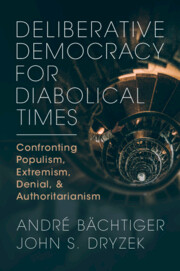 Deliberative Democracy for Diabolical Times
Deliberative Democracy for Diabolical Times Published online by Cambridge University Press: 28 March 2024
Most people in most societies do not fall into the four problematic categories of populists, extremists, deniers, and authoritarians. It is important to consider deliberation involving everybody else in these diabolical times. We could then get a deliberative democracy and a citizenry that are robust in the face of the threats to democracy and that can join in with deliberation against these threats. Equally important in light of the specific concerns we have raised in the previous four chapters, truly inclusive and effective public deliberation should reduce the proportion of people who, out of despair at the democratic alternatives, find themselves attracted to the four problematic positions. This includes allegiant citizens satisfied with existing democratic institutions, dissatisfied citizens, and critical citizens who want to participate more. We then turn to categories of people whose voice ought to be facilitated more effectively in public deliberation, including the working class, women, and marginalized cultural groups. Different deliberative forms are likely to attract different kinds of citizens, which suggests a variety of differentiated practices ranging from contestatory deliberation to more constructive and respectful deliberation oriented to the common good, all of which can join active resistance to anti-democratic transgressions and contribute to democratic renewal.
To save this book to your Kindle, first ensure [email protected] is added to your Approved Personal Document E-mail List under your Personal Document Settings on the Manage Your Content and Devices page of your Amazon account. Then enter the ‘name’ part of your Kindle email address below. Find out more about saving to your Kindle.
Note you can select to save to either the @free.kindle.com or @kindle.com variations. ‘@free.kindle.com’ emails are free but can only be saved to your device when it is connected to wi-fi. ‘@kindle.com’ emails can be delivered even when you are not connected to wi-fi, but note that service fees apply.
Find out more about the Kindle Personal Document Service.
To save content items to your account, please confirm that you agree to abide by our usage policies. If this is the first time you use this feature, you will be asked to authorise Cambridge Core to connect with your account. Find out more about saving content to Dropbox.
To save content items to your account, please confirm that you agree to abide by our usage policies. If this is the first time you use this feature, you will be asked to authorise Cambridge Core to connect with your account. Find out more about saving content to Google Drive.